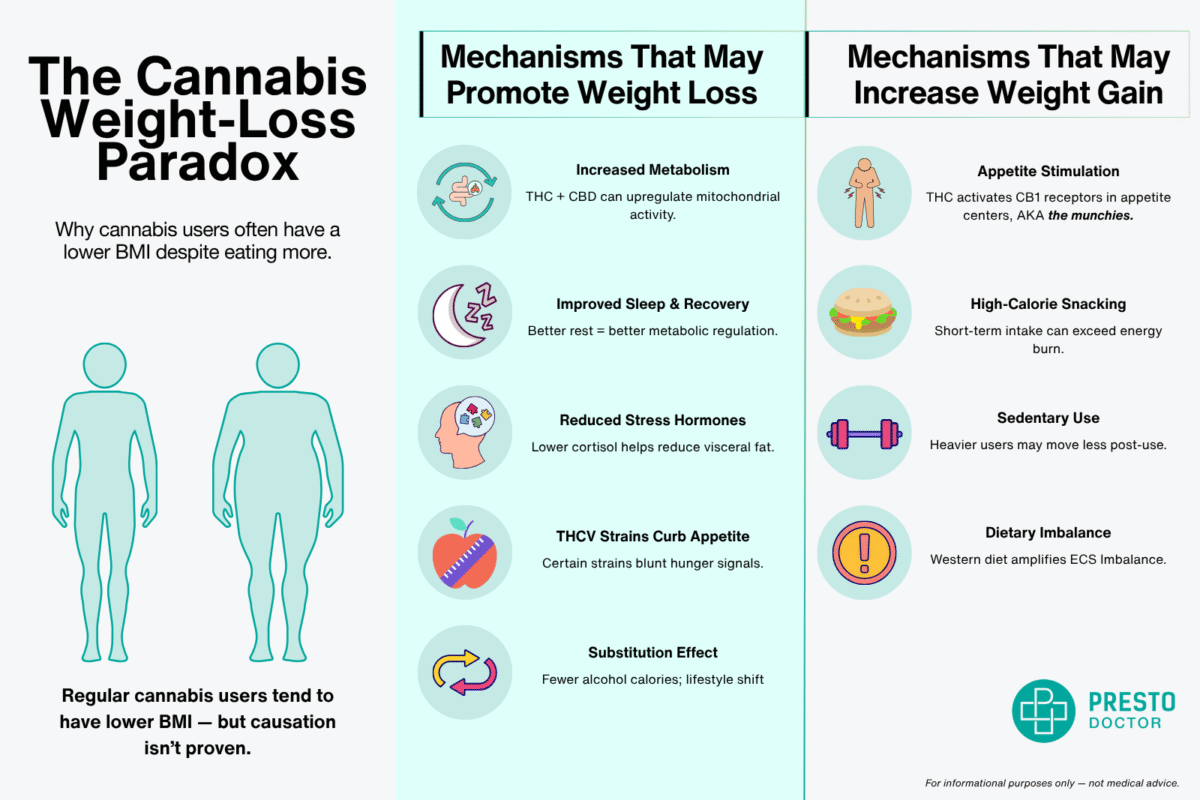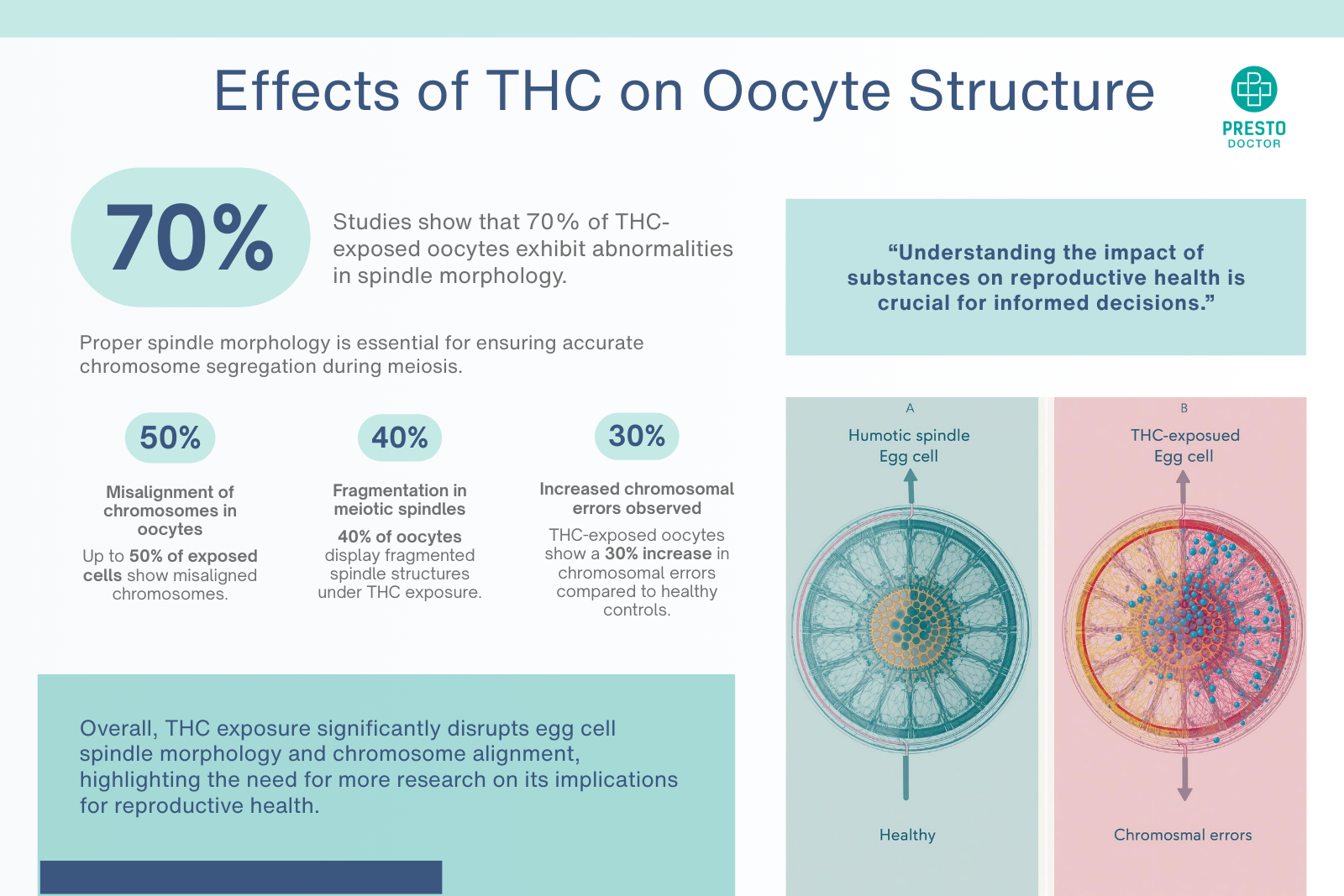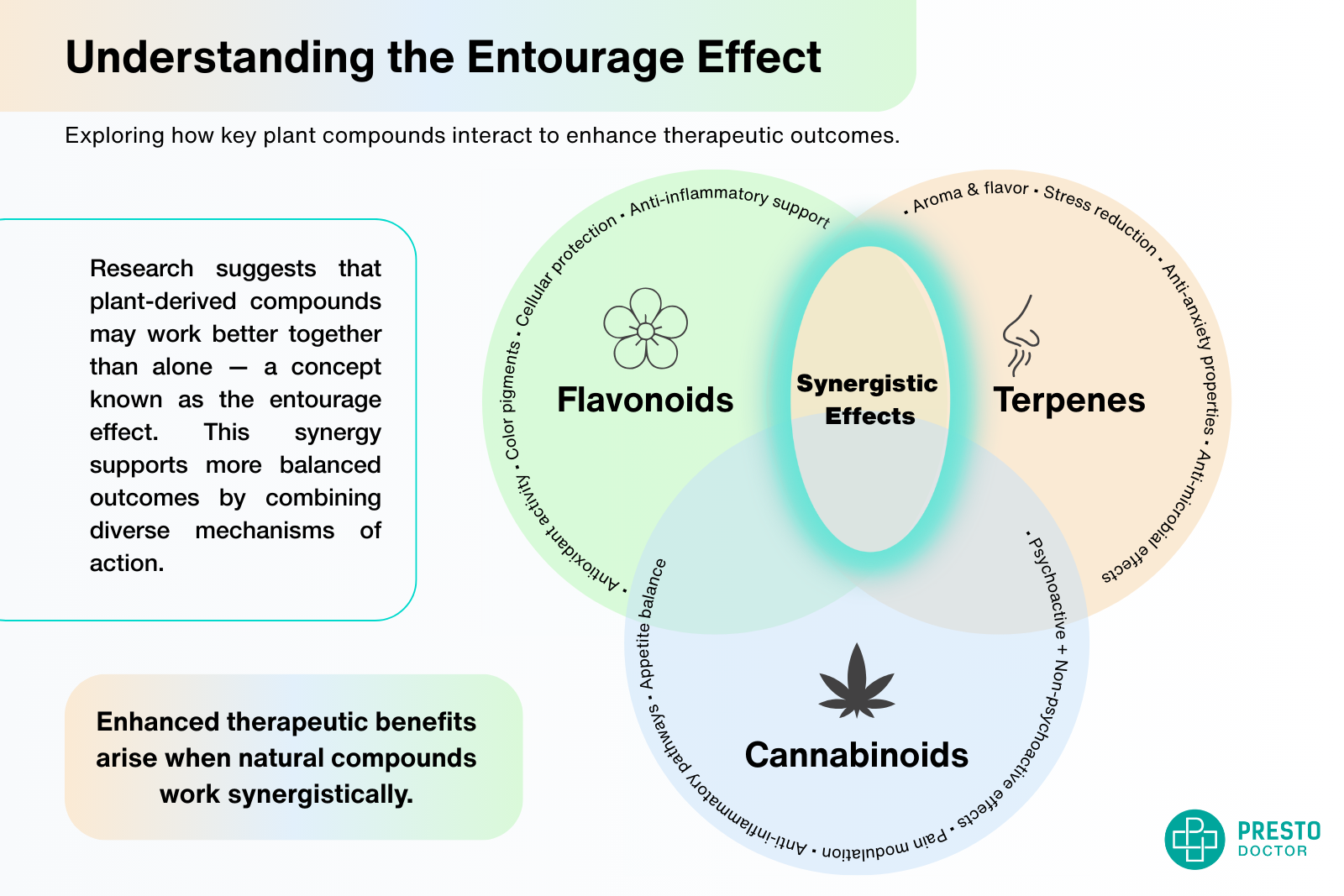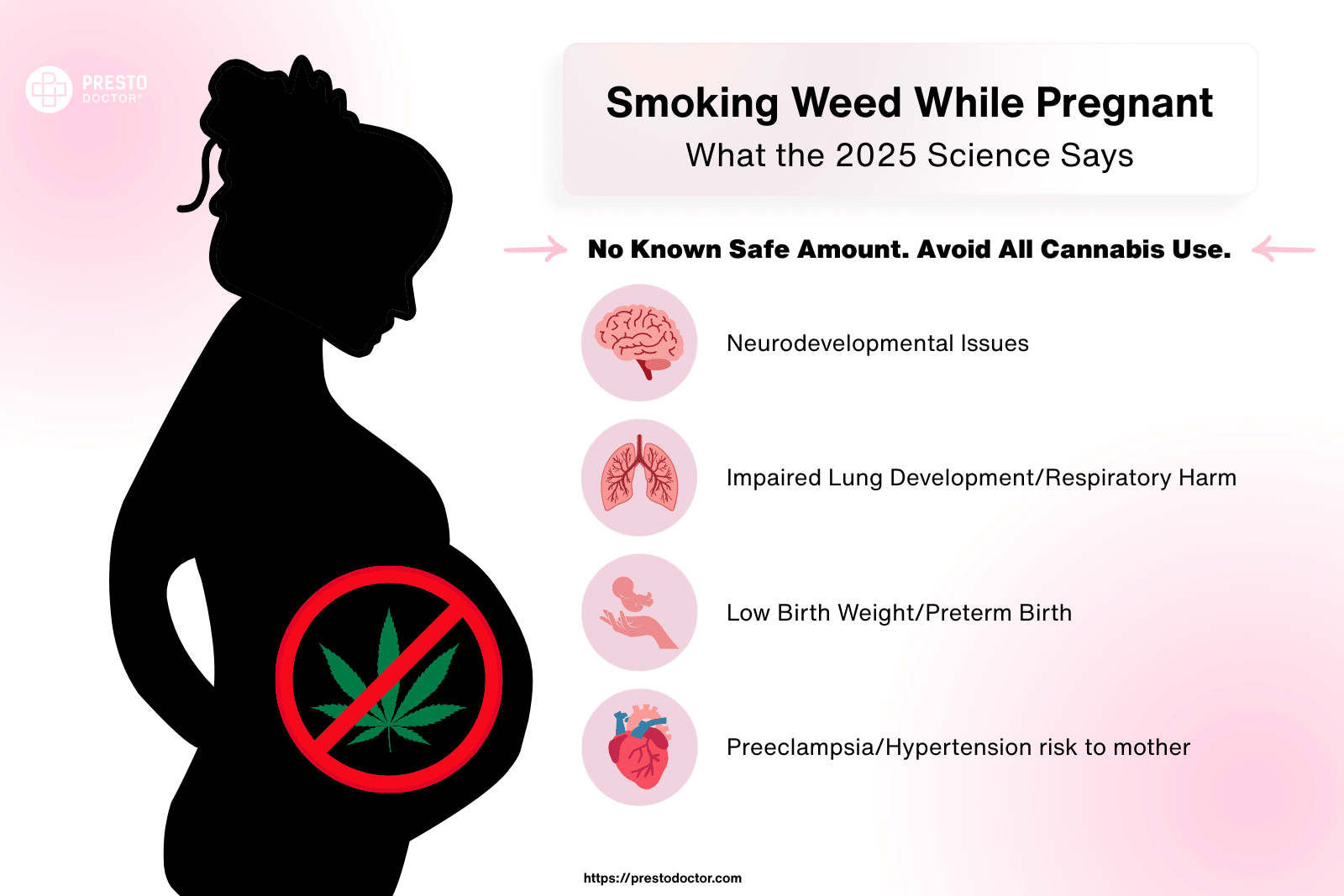
Does weed make you lose weight – or is that just a myth stoners tell themselves? This question has become increasingly popular as more people notice the surprising connection between cannabis use and body weight. While smoking weed is famously associated with “the munchies,” research reveals a fascinating paradox: regular marijuana users tend to have lower body mass indexes (BMI) than non-users. If you’ve wondered why does weed make you lose weight despite increasing appetite, or whether weed makes you gain or lose weight, this comprehensive guide examines the science, explores the marijuana weight loss paradox, and provides evidence-based answers about cannabis and weight management.
Key Takeaways
- Long-term cannabis users tend to have lower BMI and lower obesity rates in large population studies, despite higher reported calorie intake.
- Cannabis does not directly cause fat loss — it influences metabolism, appetite regulation, sleep, mobility, and lifestyle factors.
- Different cannabinoids (THC, CBD, THCV) and user patterns (frequency, strain, method) yield different outcomes.
- Using cannabis solely for weight loss is not recommended — proven strategies (nutrition, exercise, sleep) remain the foundation.
- Recent 2023 research suggests adolescent THC exposure may alter fat cell biology and energy storage, indicating long-term metabolic effects still being studied.
The Marijuana Weight Loss Paradox: Understanding the Science
Does weed make you lose weight, or does it cause weight gain? The answer reveals one of the most intriguing findings in cannabis research: the marijuana weight loss paradox. Despite the well-known appetite-stimulating effects of the munchies, multiple large-scale studies consistently show that marijuana users have significantly lower BMI and obesity rates compared to non-users.
What Research Reveals About Cannabis and Body Weight
The endocannabinoid system plays a crucial role in regulating metabolism, appetite, and energy storage. When THC binds to CB1 receptors in the brain and throughout the body, it triggers hunger signals and promotes fat storage. Yet paradoxically, chronic cannabis use appears to produce opposite effects on body weight compared to acute use.
Major epidemiological studies reveal compelling data:
Large-Scale Studies Reveal a Consistent Pattern
National Survey Findings:
- Non-users: 22-25% obesity rates
- Regular cannabis users (3+ times weekly): 14-17% obesity rates
- Cannabis users consume more calories yet maintain lower BMI
This counterintuitive relationship has researchers investigating multiple mechanisms behind the marijuana weight loss paradox, from metabolic changes to behavioral factors.
Does Weed Make You Lose Weight? The Direct Answer
Does weed make you lose weight directly? No. Marijuana isn’t some magic fat-burning supplement, and lighting up a joint won’t suddenly make pounds melt off.
However, smoking weed may indirectly influence factors that affect body weight. The connection between weed and weight loss is complicated—it involves how the endocannabinoid system works, your metabolism, your lifestyle choices, and your individual body chemistry.
The Bottom Line on Weed and Weight Loss
- Weed does NOT burn fat or directly cause weight loss (that’s not how it works)
- Long-term cannabis use is linked to lower BMI in major population studies (the data is solid on this)
- Cannabis might help with issues that cause weight gain, like chronic pain or poor sleep (indirect effects)
- Your results will vary based on how much you use, how often, what strain, and your personal biology (everyone’s different)
- Bottom line: Don’t use weed to lose weight (there are way better and safer options for weight loss)
Why Does Weed Make You Lose Weight? 7 Scientific Mechanisms
Why does weed make you lose weight when it literally makes you hungrier? For one, chronic cannabis use may rewire how your body processes sugar. Scientists have been digging into this paradox hard, and they’ve come up with several explanations that might work together:
1. Enhanced Metabolism and Insulin Sensitivity
This is probably the most interesting finding: regular cannabis users seem to have faster metabolisms and better insulin sensitivity, even when they’re eating more food. Your endocannabinoid system is deeply involved in how your body processes energy, and chronic weed use might actually rewire some of that.
What researchers have found is pretty wild. Cannabis users show better fasting insulin levels and handle sugar better despite eating more calories overall. There’s even some evidence that cannabis might activate brown fat—that’s the good kind of fat that actually burns calories to produce heat. Your body might literally be processing and storing energy differently when you use cannabis regularly.
2. Increased Physical Mobility and Activity
This one’s straightforward but important. If you’re dealing with chronic pain that keeps you on the couch, and cannabis helps with that pain, you’re probably going to move around more. More movement means burning more calories, simple as that.
People using cannabis for pain management often report they can exercise more comfortably, recover faster from workouts, and just generally feel more willing to be active. When you’re not hurting all the time, you naturally do more physical stuff, and that adds up over time.
3. Stress Reduction and Cortisol Management
In addition to managing stress, cannabis might help with another weight issue: stress eating is real, and it’s a major reason people gain weight. When you’re chronically stressed, your body pumps out cortisol, which basically tells your body to store fat, especially around your belly.
Cannabis is well-known for reducing anxiety and helping people chill out. If you’re using weed to relax instead of eating your feelings away with a pint of ice cream, that’s going to affect your weight over time. Lower stress also means lower cortisol, which means less of that stress-induced fat storage.
4. Improved Sleep Quality and Duration
Furthermore, sleep is huge for weight management, and most people don’t realize how important it is. When you don’t sleep well, your hunger hormones (ghrelin) go up and your fullness hormones (leptin) go down. You end up eating more without even realizing it.
There’s solid evidence that cannabis can help people fall asleep faster and sleep more soundly, especially people with insomnia. If you’re getting those 7-9 hours of quality sleep regularly instead of tossing and turning, your body’s weight regulation system works way better. Cannabis might help reduce how long it takes you to fall asleep and cut down on waking up during the night.
5. Reduced Alcohol Consumption
Here’s something people don’t always consider: younger cannabis users often drink less alcohol than their non-smoking peers. Alcohol is calorie-dense (7 calories per gram—almost as much as pure fat), and it usually comes with drunk munchies that make you order pizza at 2 AM.
Meanwhile, if someone’s using cannabis instead of drinking, they’re cutting out all those liquid calories plus the terrible food choices that come with being drunk. It’s a simple calorie math equation, but it can make a real difference.
6. Competition for Brain Reward Pathways
This theory is fascinating: food and drugs might actually compete for the same pleasure centers in your brain. When you smoke weed and get that dopamine hit, your brain might not need to seek out that same reward from eating a bunch of junk food.
In other words, cannabis might reduce food cravings by already activating those reward pathways. You might find yourself less interested in eating for pleasure rather than actual hunger. Your food preferences might shift too—what seems irresistibly delicious when you’re sober might not have the same appeal when you’re already getting pleasure from cannabis.
7. Cannabinoid Receptor Regulation
Finally, there’s what scientists call receptor downregulation. Basically, when you use cannabis regularly for a long time, your CB1 receptors start to decrease in number or become less sensitive. Since activating these receptors normally triggers appetite and fat storage, having fewer of them (or having them work less effectively) could lead to different metabolic effects.
Long-term users essentially develop a tolerance to the appetite-boosting effects. Your body’s whole endocannabinoid system adjusts to having THC around constantly, and that might create a new metabolic baseline that’s different from both non-users and occasional users.
Does Smoking Weed Make You Lose Weight More Than Edibles?
Does smoking weed make you lose weight differently than other consumption methods? The method of cannabis consumption may influence weight effects, though research specifically comparing methods is limited.
Smoking Cannabis
Smoking weed gets cannabinoids into your bloodstream super fast through your lungs. You feel the effects within minutes, which makes it easier to control how much you’re taking. Some people think the rapid metabolism spike from smoking might affect weight more, but that’s mostly speculation.
However, smoking comes with some serious downsides you can’t ignore. Cannabis smoke has a lot of the same nasty stuff as tobacco smoke—carcinogens, toxins, the works. And because people tend to inhale weed smoke deeper and hold it longer, you’re getting more tar exposure per breath than cigarette smokers. Over time, this damages your lungs, causes chronic bronchitis, and makes your cardiovascular system work less efficiently. If you’re trying to get healthier and lose weight, destroying your lungs and heart isn’t exactly helping.
Cannabis Edibles
Edibles work completely differently. Your digestive system processes them, turning THC into 11-hydroxy-THC, which is actually more potent. The effects last way longer (4-8 hours versus 2-3 for smoking), and you don’t damage your lungs at all.
On the other hand, edibles are tricky to dose because they take 30 minutes to 2 hours to kick in. It’s really easy to eat too much, and when the effects hit, they hit hard. That might make you more sedentary, which obviously isn’t great for weight. Also, let’s be real—most edibles are brownies, cookies, and gummies, which are packed with sugar and calories themselves.
Vaping and Tinctures
Vaping is somewhere in the middle—less harmful than smoking but still not great for your lungs. Tinctures (liquid drops under your tongue) give you moderate onset time with pretty precise dosing. Capsules work like edibles but with exact measurements.
The verdict? No consumption method of cannabis is recommended for weight loss specifically. If you’re using it for legitimate medical reasons, stick with non-smoking methods to avoid the respiratory damage.
The Munchies vs. Long-Term Weight Effects Explained
At first glance, the munchies seem to completely contradict all that research about marijuana users being thinner. But once you understand the difference between what happens when you first smoke versus regular long-term use, the paradox starts making sense.
Short-Term: Yeah, You’re Gonna Eat
When someone uses cannabis occasionally or for the first time, the appetite effect is crystal clear. Low doses might not do much, but moderate to high doses increase your daily calories by 30-40%. THC fires up those CB1 receptors, and suddenly you’re not just hungry—you’re ravenous.
Here’s what typically happens: You’re not necessarily eating bigger meals. Instead, you’re snacking way more between meals. And it’s not like you’re craving salads—your brain wants high-fat, high-sugar junk food. Studies show people consume an extra 600-1000 calories after smoking, mostly from chips, cookies, ice cream, and fast food. The munchies are absolutely real for occasional users.
Long-Term: The Plot Twist
In contrast, people who use cannabis regularly over months and years show a totally different pattern. Despite still eating more calories overall, they maintain lower BMI. They’re less likely to be obese. They don’t seem to gain weight the way you’d expect.
So what gives? Scientists think several things might be happening at once. Your body might make metabolic adaptations to chronic cannabis exposure. Those CB1 receptors might become less sensitive (tolerance). You might naturally adjust your eating habits and activity levels. Long-term users often pick strains that don’t trigger munchies as badly. And many regular users also consume CBD, which seems to counteract some of THC’s appetite effects.
Why the Difference?
Several theories explain why smoking weed long-term produces different weight effects than occasional use:
- Tolerance development: Regular users develop tolerance to appetite-stimulating effects
- Metabolic adaptation: Chronic exposure may alter baseline metabolism
- Lifestyle integration: Regular users may adjust eating patterns and activity
- Strain selection: Long-term users may choose strains with less appetite stimulation
- CBD co-consumption: Regular users often consume CBD which may counteract THC’s appetite effects
Cannabis Strains and Weight: THC vs CBD vs THCV
Not all cannabis affects weight the same way. Understanding different cannabinoids helps explain why does weed make you lose weight for some users while others experience weight gain.
THC (Tetrahydrocannabinol): The Appetite Stimulator
THC is the primary psychoactive compound responsible for the munchies.
Effects on weight:
- Activates CB1 receptors, triggering hunger
- Increases food palatability and enjoyment
- Promotes fat storage and energy conservation
- Used medically as appetite stimulant (Marinol/dronabinol)
Best for: Patients with cachexia, HIV/AIDS, cancer-related appetite loss
CBD (Cannabidiol): The Potential Appetite Suppressant
CBD may help with weight loss through several mechanisms:
Effects on weight:
- May reduce appetite and food intake
- Improves insulin sensitivity and glucose metabolism
- Promotes “fat browning” (conversion of white fat to brown fat)
- Counteracts some appetite-stimulating effects of THC
- Reduces inflammation associated with obesity
Research status: Promising but limited; more studies needed
THCV (Tetrahydrocannabivarin): The Appetite Suppressor
THCV is an emerging cannabinoid with unique properties:
Effects on weight:
- Acts as CB1 receptor antagonist (blocks hunger signals)
- Significantly reduces appetite and food intake
- May increase energy expenditure
- Improves glucose tolerance and insulin sensitivity
- Promotes fat loss in animal studies
Strains high in THCV: African landrace strains, Durban Poison, certain Tangie varieties
Strain Recommendations
For potential appetite suppression:
- High-CBD, low-THC strains
- THCV-rich strains (typically African sativas)
- Balanced THC:CBD ratio strains (1:1 or 2:1)
Strains that may increase appetite:
- High-THC indica strains
- Classic “munchies” strains (OG Kush, Cookies varieties)
- Strains bred specifically for appetite stimulation
Important note: Individual responses vary significantly. Strain effects on appetite and weight are not guaranteed and depend on individual endocannabinoid system variations.
Marijuana Users and Lower BMI: What Major Studies Show
Multiple large-scale epidemiological studies demonstrate that marijuana users consistently have lower BMI than non-users, creating the marijuana weight loss paradox.
Recent Research update (2023):
A study published in Cell Metabolism found that adolescent exposure to low-dose THC disrupted fat-cell storage and energy mobilization in adulthood — leading to leaner body composition but also impaired nutrient release for muscle/brain activity. While this study was in animals, it signals that the endocannabinoid system’s role in weight and fat storage is more complex and still unfolding.
Meta-analyses published since 2018 continue to show cannabis users average lower BMI; however, the jury is still out on whether cannabis causes this or is a marker of lifestyle variables.
The CARDIA Study (Coronary Artery Risk Development in Young Adults)
Study details:
- 3,617 participants tracked over 15 years
- Ages 18-30 at enrollment
- Representative black and white populations
Key findings:
- Marijuana users consumed MORE calories (3,365 kcal/day vs 2,746 kcal/day)
- No increase in body mass index despite higher intake
- More extensive marijuana use correlated with higher calorie consumption
- No corresponding weight gain observed
National Epidemiologic Survey on Alcohol and Related Conditions (NESARC)
Study details:
- 41,633 participants
- Nationally representative U.S. sample
Key findings:
- Non-users: 22.0% obesity rate
- Regular users (3+ times/week): 14.3% obesity rate
- Significant difference even after adjusting for confounding factors
National Comorbidity Survey Replication (NCS-R)
Study details:
- 9,103 participants
- Comprehensive mental health and substance use data
Key findings:
- Non-users: 25.3% obesity rate
- Regular users: 17.2% obesity rate
- Consistent with NESARC findings
Third National Health and Nutrition Examination Survey (NHANES III)
Study details:
- 10,623 adult participants
- Comprehensive health and nutrition data
Key findings:
- Current marijuana users reported higher calorie intake
- Lower BMI in current users vs. non-users
- Higher rates of tobacco use among marijuana users (potential confounding factor)
Australian Longitudinal Study
Study details:
- 2,566 young adults
- 21-year follow-up period
Key findings:
- Lower prevalence of overweight and obesity in marijuana cohort
- Associations maintained over extended follow-up
Meta-Analysis of Cannabis and BMI
A comprehensive meta-analysis examining multiple studies found:
- Cannabis users had significantly lower BMI across all studies
- Lower obesity rates despite increased calorie intake
- Effects consistent across different populations and study designs
- Mechanisms remain partially unexplained
Important Caveats
These studies show association, not causation. Potential confounding factors include:
- Polysubstance use (stimulants, other drugs reducing appetite)
- Higher rates of other drug use among marijuana users
- Socioeconomic and lifestyle differences
- Varying marijuana potency, frequency, and consumption methods
- Self-reporting biases
- Selection bias in who uses marijuana
Medical Applications: When Cannabis May Help With Weight
Despite the warnings about recreational use, cannabis does have some legitimate medical applications for weight issues. However, these are specifically for people who need to gain weight, not lose it.
HIV/AIDS Patients: FDA-Approved Use
The FDA actually approved synthetic THC (dronabinol/Marinol) for HIV/AIDS patients dealing with wasting syndrome. When you’re immunocompromised and losing dangerous amounts of weight, stimulating appetite can literally save your life. Studies found that patients using cannabis or dronabinol gained about 3.5 kg compared to 1.3 kg in placebo groups. Both smoked marijuana and the pill worked about equally well.
The effectiveness is moderate—appetite goes up, but actual weight gain varies from person to person. Still, for people who are wasting away, any weight gain is valuable.
Cancer Patients: Mixed Results
For cancer patients dealing with cachexia (severe weight loss and muscle wasting), the research is less promising. Some clinical trials showed no real difference between cannabis and placebo. In studies that compared cannabis to other medications, synthetic hormones like megestrol worked better for weight gain.
That said, cannabis does help with nausea, which indirectly helps people keep food down and eat more. It might not be the first choice for cancer-related weight loss, but some patients do benefit. The study sizes have been pretty small though, so we need more research.
Not Recommended for Eating Disorders
While theoretically cannabis’s appetite effects could help with anorexia nervosa or severe nutritional deficiencies, medical professionals don’t recommend it. The psychological risks for people with eating disorders are too high. There’s potential for substance misuse, we don’t have evidence-based protocols, and frankly, there are better treatments available.
The Chronic Pain Connection
On the other hand, there is an indirect benefit worth mentioning. If someone gained weight because chronic pain kept them immobile, and cannabis helps manage that pain well enough to be more active again, that could support weight loss through increased activity. Better quality of life, more exercise tolerance, better recovery—these can all contribute to weight management when pain was the primary barrier.
Risks and Dangers of Using Weed for Weight Loss
Despite the intriguing research showing marijuana users have lower BMI, using weed for weight loss carries significant risks.
Respiratory and Cardiovascular Dangers
Smoking weed poses serious health risks:
Lung damage:
- Cannabis smoke contains many toxins and carcinogens found in tobacco
- Deeper inhalation and longer breath-holding increase tar exposure
- Chronic bronchitis and airway inflammation
- Reduced lung function over time
- Increased respiratory infections
Cardiovascular risks:
- Elevated heart rate (tachycardia)
- Increased blood pressure
- Impaired cardiovascular function during exercise
- Potential interaction with heart medications
- Risk factors for cardiovascular events in susceptible individuals
Addiction and Dependency
Cannabis use disorder affects:
- Up to 30% of regular marijuana users
- 9% of all users develop dependence
- Higher rates among those who start young
- Withdrawal symptoms include irritability, insomnia, decreased appetite
Warning signs:
- Using more than intended
- Unsuccessful attempts to cut down
- Significant time spent obtaining or using
- Cravings and urges
- Continued use despite problems
Mental Health Concerns
Psychiatric risks:
- Anxiety and paranoia, especially with high-THC strains
- Increased risk of psychosis in susceptible individuals
- Worsening of depression symptoms in some users
- Cognitive impairment and memory problems
- Amotivational syndrome with heavy chronic use
Impaired Judgment and Accidents
- Impaired driving and increased accident risk
- Reduced reaction time and coordination
- Poor decision-making
- Workplace safety concerns
Drug Interactions
Cannabis interacts with numerous medications:
- Blood thinners (warfarin)
- Sedatives and sleeping pills
- Antidepressants and anxiety medications
- Pain medications
- Heart medications
Always consult healthcare providers before using cannabis with any medications.
Why Cannabis Isn’t Recommended for Weight Loss
- Lack of evidence for direct weight loss effects
- Significant health risks, particularly from smoking
- Better alternatives available (diet, exercise, medical treatments)
- Individual variation makes effects unpredictable
- Potential for misuse and dependency
- Legal status varies by location
- Absence of clinical guidelines for weight management use
Frequently Asked Questions
No. While studies show marijuana users have lower BMI, cannabis doesn’t directly cause weight loss. The relationship involves indirect factors like metabolism changes, increased activity from pain relief, and better sleep. Cannabis is not recommended as a weight loss tool.
This is the marijuana weight loss paradox. Acute use increases appetite, but chronic users maintain lower BMI. Possible reasons include metabolic adaptations, CB1 receptor desensitization, increased physical activity, better sleep, and also stress reduction. The exact mechanisms aren’t fully understood.
Yes. Multiple large studies show marijuana users have lower BMI and reduced obesity rates. The NESARC study found 22% obesity in non-users versus 14.3% in regular users. Users consumed more calories yet didn’t gain weight, creating a research paradox.
It depends on multiple factors. High-THC strains typically increase appetite and may promote weight gain. High-CBD strains may suppress appetite. THCV-rich strains act as appetite suppressants. However, individual responses vary greatly, and no strain is reliable for weight management.
No. Medical professionals don’t recommend marijuana for weight management. While cannabis use correlates with lower BMI, it doesn’t safely or effectively cause weight loss. Smoking causes respiratory damage and addiction risks. Better alternatives include balanced nutrition, exercise, and medical weight loss programs.
Conclusion: The Complex Truth About Weed and Weight Loss
Does weed make you lose weight? The scientific answer is nuanced: while marijuana use is associated with lower body mass index in population studies, cannabis doesn’t directly cause weight loss and shouldn’t be used for weight management.
The marijuana weight loss paradox—where smoking weed triggers appetite yet users maintain lower BMI—remains partially unexplained. Contributing factors likely include metabolic adaptations, improved insulin sensitivity, increased physical activity, better sleep, stress reduction, and various lifestyle factors.
Why does weed cause weight loss in some people? The answer involves complex interactions between the endocannabinoid system, individual physiology, consumption patterns, cannabinoid profiles (THC vs CBD vs THCV), and also numerous confounding variables that studies cannot fully control.
Key Takeaways:
- Association exists: Multiple studies confirm marijuana users have lower BMI
- Not causation: This doesn’t prove cannabis causes weight loss
- Mechanisms unclear: Multiple theories exist but none fully proven
- Significant risks: Smoking causes serious respiratory and also cardiovascular damage
- Individual variation: Effects differ dramatically between people
Final Recommendation:
For weight loss, pursue proven methods: balanced nutrition, regular physical activity, adequate sleep, stress management, and professional medical guidance when needed but don’t use cannabis as a weight management tool.
If you’re considering cannabis for any health purpose, consult qualified healthcare professionals who can assess your individual situation, discuss potential risks and benefits, and recommend appropriate evidence-based treatments.
If you’re using cannabis already for medical reasons (pain, sleep, anxiety) and you notice stable weight or lower BMI — that’s consistent with the current research. But if you’re solely using cannabis in hopes of weight loss, you should shift your focus to evidence-based strategies: consistent sleep 7–9 hours, balanced diet, movement (even light activity), and stress reduction. Use cannabis as a potential adjunct (if appropriate), not a primary weight-loss tool.
The relationship between weed and weight loss remains an fascinating area of ongoing research, but current evidence doesn’t support using marijuana as a weight loss strategy.
Medical Disclaimer: This article is for informational purposes only and should not be considered medical advice. Always consult qualified healthcare providers before using cannabis or making significant changes to your health regimen. If you struggle with weight management, seek evidence-based treatment from licensed medical professionals.
References: Information in this article is based on peer-reviewed research from sources including the American Journal of Epidemiology, the Coronary Artery Risk Development in Young Adults (CARDIA) study, the National Epidemiologic Survey on Alcohol and Related Conditions (NESARC), and multiple published studies on cannabis, metabolism, and body weight available through PubMed and medical journals.






